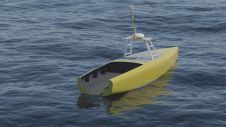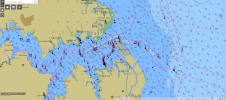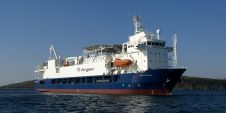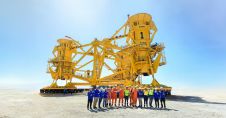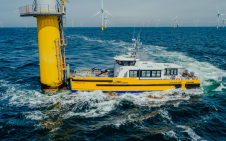Embracing the Importance and Value of Data
With one year left as President (name soon to become Secretary-General) of the IHO, it seems like a good time to consider where I think the world’s national Hydrographic Offices (HOs) need to go next. Simply said: “it’s no longer about charts and maps only - it’s now all about data and data access!”.
Robert Ward, International Hydrographic Bureau, Monaco
What do I mean? Well, when I look at the world’s national mapping agencies, I see a rapid move away from organisations existing to make and maintain a country’s national map collection to organisations acting as providers of the national collection of primary geodata. They are re-organising to make data, rather than just maps, available to a diverse user community: government departments, commercial developers and the public. This drive is recognition that fundamental geodata is a key enabler for economic development and the sustainable use of the environment. In this context, elevation and its marine counterpart, depth, must be one of the most fundamental of those geo-datasets.
Turning some of the geodata in the national data-store into official map-like products is a specialism of these organisations, but it is no longer the reason they exist. Indeed, the creation of map products and services is often out-sourced or licensed, even when the national organisation remains responsible for the provision of these services. National mapping agencies increasingly see themselves at the heart of the national spatial data infrastructure. They mostly follow the concept of open-data, where data is openly accessible and provided at a moderate or no cost to users - the national economic rewards being derived through the secondary and subsequent use of the data.
Considering what is going on, should our national Hydrographers focus data gathering efforts primarily on supporting their national nautical chart series or should the scope of their activities be broadened, as with mapping agencies? While supporting safe navigation remains a fundamental responsibility, unless HOs also support the maritime element of Spatial Data Infrastructures, it is only a matter of time before other agencies take on the role. Indeed, this has already been done successfully in several countries - and there is no reason to think it is a bad solution.
I am concerned that a number of our HOs represented in the IHO are significantly limited in their ability to expand their mandate to embrace a Maritime Spatial Data Infrastructure (MSDI), particularly those HOs embedded in defence organisations, where nautical charts, supporting freedom of manoeuvre for warships, and the provision of operational geospatial intelligence, remain paramount. HOs subject to a cost-recovery regime may be similarly constrained, particularly when the global trend is to make access to fundamental geodata free or at minimal cost. For some HOs, adopting a wider, important national infrastructure development and investment role by supporting the blue economy and the overall governance of the marine environment, may not be easy.
I am, nevertheless, pleased to see that an increasing number of our IHO Member States are moving in what I consider is the best direction. An increasing number are realising that data from all sources, such as crowdsourcing and remotely-sensed data, can be useful in helping to populate a national geospatial database - even if not all the information is suitable to incorporate directly into a chart or map. This is why the IHO has working groups considering these options, assisting and advising our Member States accordingly.
However, the question remains whether all our HOs are in a position to choose to make the move towards being at the heart of MSDI - or must they wait until they are either pushed out or taken over?

Value staying current with hydrography?
Stay on the map with our expertly curated newsletters.
We provide educational insights, industry updates, and inspiring stories from the world of hydrography to help you learn, grow, and navigate your field with confidence. Don't miss out - subscribe today and ensure you're always informed, educated, and inspired by the latest in hydrographic technology and research.
Choose your newsletter(s)


















